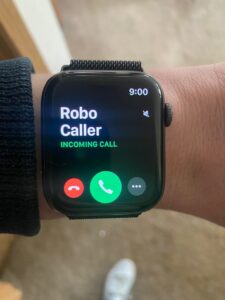Stop Robocalls | Class Action Lawsuits for Robocalls
Robocalls have been annoying people in their homes for decades. 
These junk calls are typically pre-recorded messages used by telemarketers to sell you goods and services, and they can also be made by a live person after the call has been made by an auto dialer. Robocalls are made to landlines as well as cellphones.
In many cases, the robocalls you receive are illegal.
The Telephone Consumer Protection Act (TCPA) was enacted to help protect consumers from intrusive spam phone calls.
The TCPA puts restrictions on what robocallers can do and as of October 16, 2013, it is required for businesses to obtain expressed written consent before calling anyone on their landline or mobile phones.
People can also add their number to the “Do Not Call” list that robocallers are legally obligated to follow, but these lists are often ignored. If you have included your residential or personal cell phone number(s) on the federal DO NOT CALL LIST, you may be entitled to additional statutory damages of up to $500 per call.
Contact Us Today For a Free Consultation
If you are being annoyed or harassed by robocalls and you want them to stop, you can take steps to stop them up to and including legal action. You can sue telemarketers for calling you illegally and in some cases, it is possible to bring a class action lawsuit for robocalls.
Take Legal Action Against Robocalls
At Anderson + Wanca, our experienced attorneys can provide representation to help you take legal action against spam phone calls. We will help you file complaints with the FCC and provide representation if you file a lawsuit.
Our law firm is located in the suburban Chicago, IL area and we can provide representation throughout the United States.
Contact Anderson + Wanca at (855) 827-2329 or use our contact form to receive a free consultation
The TCPA Law Against Robocalls
Congress created and passed the TCPA to protect consumers from unsolicited phone calls, text messages, and prerecorded messages. Under this law, robocallers are not allowed to do any of the following:
- Call your home or cellphone before 8 am or after 9 pm
- Call anyone on the Do Not Call list
- Call your home or cellphone without your permission
- Refuse to identify themselves or the person or organization on whose behalf they are calling
Under this law, telemarketers are also required to keep their own internal do not call lists including people who ask to no longer receive their calls. If a telemarketer fails to comply with any of these rules, you can file a lawsuit against them.
How to Protect Yourself from Spam Phone Calls
If you are constantly bothered by spam phone calls, there are a few things you can do to protect yourself and stop these calls:
- Revoke previous consent: According to the TCPA, robocallers can only call you if they have your express written consent. If you granted this consent at one point, you can revoke it by sending them a letter or by telling them on the phone that you no longer consent to these phone calls.
- Opt out: Robocallers with an automated message are required to include an opt-out feature in their message that allows you to opt out and stop receiving their calls. Make sure you use this option to opt out.
- Join the National Do Not Call List: You can put your residential landline and personal cell phone number(s) on the National Do Not Call List by calling (888) 382-1222 or visiting donotcall.gov. By law, robocallers are not allowed to call anyone on this list, whether the calls are made by an autodialer or a live person. Certain automated calls can still be made to people on the Do Not Call list by charities, political groups, healthcare organizations, and emergency contact systems. Debt collectors cannot make automated calls to people without permission, but they can make non-automated calls, even to those in the Do Not Call list.
- File a complaint with the FCC: It is common for telemarketers to ignore the rules put in place by the TCPA, including the Do Not Call list. If you are getting robocalls in violation of this law, you can file a complaint to the FCC. You can do this by filling out a complaint form on the FCC website in which you will provide your email address, description of your complaint, and screenshots of the robocaller calling your phone. You will generally not be able to recover your individual damages.
How to Sue Robocalls and Telemarketers
It is important to report spam calls to the FCC if they are in violation of the TCPA.
The FCC will determine if the robocaller has violated the TCPA, but this will not result in you receiving anything for the statutory damages the TCPA entitles you to.
To seek damaged from unsolicited robocalls, you need to contact an experienced attorney and file a lawsuit.
Before taking legal action against robocalls, make sure you gather the following to help with your case:
- A record of the voicemails and calls you receive. You can record voicemails that are left for you, but you may not be able to record live phone calls without permission from the other party depending on state laws.
- A record of the date and time of all calls as well as who called you and the nature of the conversation.
- A copy of letters revoking consent that you have sent to telemarketers.
Our attorneys at Anderson + Wanca can provide representation if you want to pursue legal action against robocallers. We can help determine if the telemarketer violated the TCPA and secure any damages that you are entitled to under this law. Our experienced TCPA attorneys can also bring class action lawsuits for robocalls.
Contact Anderson + Wanca by calling (855) 827-2329 to talk to our attorneys about a robocall lawsuit or submit a contact form.
Contact Us Today For a Free Consultation
Contact Us to Stop Robocalls
If you receive robocalls regularly, enter your name and phone number and we will contact you for a free consultation!
